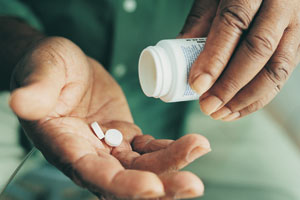Steroids, Surgery and Other Problems with Crohn's Disease
 Affecting as many as 600,000 people in North America, Crohn's disease is one of the most uncomfortable diseases patients can have. If you have Crohn's disease, you may not always be aware of the fact that your symptoms, triggers and potential causes when examined in detail are different than other patients, this is why one patient may see benefit and others do not. Certain clinics are now looking at these factors and are making a huge impact on patient outcomes. The bottom line is that these differences can profoundly impact and make for better treatment plans for patients. This article will describe powerful new approaches to Crohn's disease.
Learning more about your likely causes, rather than focusing on a set of symptomatic Band-Aid treatments that only temporarily help inflammation. Integrative dynamic medical solutions can help patients customize therapy far beyond common medications and surgery options, simply by including each patient's "triggers" and "possible causes" at the core of treatment.
Affecting as many as 600,000 people in North America, Crohn's disease is one of the most uncomfortable diseases patients can have. If you have Crohn's disease, you may not always be aware of the fact that your symptoms, triggers and potential causes when examined in detail are different than other patients, this is why one patient may see benefit and others do not. Certain clinics are now looking at these factors and are making a huge impact on patient outcomes. The bottom line is that these differences can profoundly impact and make for better treatment plans for patients. This article will describe powerful new approaches to Crohn's disease.
Learning more about your likely causes, rather than focusing on a set of symptomatic Band-Aid treatments that only temporarily help inflammation. Integrative dynamic medical solutions can help patients customize therapy far beyond common medications and surgery options, simply by including each patient's "triggers" and "possible causes" at the core of treatment.
Learning more about the disease from all angles will go a long way in finding proper treatment. Fortunately, there are different approaches out there to help patients. Let's look closer.
Crohn's Disease – A Brief Overview
Crohn's disease can affect any part of the gastrointestinal tract, from the anus to the mouth, wrecking havoc on the whole body. It's characterized by many symptoms, most notably diarrhea (often with blood), lots of vomiting, weight loss and abdominal pain. But that's not the worst of it – it can also cause fatigue, difficulty concentrating, ocular inflammation, skin rashes and joint pain, including arthritis. Signs you may have Crohn's include porridge-like stools, often with steatorrhea (excess fat present in feces). It also depends on which area of the colon is suffering – ileitis involves large-volume, watery bowel movements whereas colitis may involve smaller volumes at higher frequency. The visual pathology during colonoscopy in Crohn's disease says a lot about the autoimmune behavior and chronic inflammation of this disease. Crohn's disease has a particular pattern of inflammation and autoimmunity that can follow the entire depth of the intestinal wall with ulcerations found in patients with highly active disease. There is usually an abrupt transition between normal healthy tissue and the ulcer – the famous visual presentation called "skip lesions." Noting these abrupt changes is one tool used in diagnosis. Under a microscope the colon tissue may show mucosal inflammation, with infiltration of neutrophils (white blood cells from the immune system) found in inflammation. This typically occurs in the area of lymphoid aggregates (immune rich regions). These neutrophils, along with mononuclear cells, may infiltrate the crypts, leading to inflammation (crypititis) or abscess (crypt abscess). Granulomas, aggregates of macrophage (another immune cell is seen). This all leads to mucosal damage and destruction of intestinal villi. Following this pattern, it's apparent how involved the immune system is with this autoimmune disease process. This tells a lot about how to treat the patient. The symptoms are all often connected to autoimmunity and inflammation. The microbial populations or the gut flora within the regions of colon inflammation are also highly disrupted and linked to continuation of the disease process. Many patients will exhibit symptoms of Crohn's for years before being diagnosed. Usually, the disease manifests between 15 and 30 years of age, but can occur at any time in a patient's life. Crohn's is quite similar to ulcerative colitis, but has distinct differences. To learn more about ulcerative colitis, click here.
What Causes Crohn's Disease?
Genetics plays the biggest role in Crohn's, as over thirty genes have been linked to development of the disease, but regrettably, there is no known cause or cure. There is hope however, as there are some good indicators. Many environmental factors, such as diet, exposure to toxicity and heavy metals, as well as other nasty complications are shown to be a big factor. Modern diagnosis of Crohn's seem to indicate that microorganisms are taking advantage of their host's weakened mucosal layer, preventing the body from clearing these bad bacteria off the intestinal walls. What's more, there are different strains of Crohn's, suggesting that this bowel disease is actually an umbrella of different pathogens. It is believed that environmental factors, such as infections (bacterial like Lyme disease, fungal like candidiasis, parasitic and viruses, chemical toxicity and heavy metals poisoning) are just as important. In fact, genetic susceptibilities related to patients' immune system responses, coupled by infectious exposures, creates the perfect storm for causing IBD. The symptoms are often worsened by triggers like dietary changes, emotional stress patterns and allergen exposures. Most patients again focus on managing the triggers, but really never quite treat the cause. As you can see, most doctors only treat symptoms, often with medications that can be addictive or dangerous. If only they would instead address these causes. Conventional therapeutic concepts are only moderately successful and patients may still never reach remission. Furthermore, surgery doesn't actually cure the disease and is only used in cases of intestinal blockage. This new methodology is far more involved, rather than just prescribing medications and hoping for the best. Let's compare and contrast the mainstream medical approach with our unique strategy.
The Conventional Route Versus The Integrative Route
Most patients with Crohn's will be prescribed steroids for a long period, but while this is helpful, it's nothing but a band-aid solution. Patients can become desperate, taking many medications, trying various supplements and getting surgery when necessary, but many people have no clue what they're doing to themselves. Most doctors don't even bother looking for a cause, focusing on candida infections and ignoring the other coinfections, as mentioned earlier. However, it is believed the roots of Crohn's disease is the result of infections complicated by chemical toxins and heavy metals that bring about epigenetic shifts to already susceptible genetic immunity. These foreign bodies can cause the immune system to attack self-mimicking antigens. This brings about an immune malfunction and inflammatory cascade that leads to the production of harmful bacteria and the under population of healthy bacterial to create a viscous destructive cycle to the colon wall. The turning on of this genetic immune switch also impacts the growth and development of future T-cells. The ultimate outcome is immune cells that have inappropriate immune responses to "self" proteins, which underlie the autoimmune disease process, allergies and hypersensitivities that patients struggle with. Testing and treating all the factors for each individual patient is the key to the integrative process. Not everyone has the same infectious response or the same triggers or the same immune system predispositions. Furthermore, if you have additional symptoms to Crohn's, such as memory loss or joint pain, this is a good indication of the full-body infectious theory of autoimmune disease involvement. Modern medicine groups all autoimmune diseases into one large group based on symptoms and clinical evaluation. However, deeper analysis, testing and intake lead us to we believe various causative agents in each patient have been ignored for too long. When these other factors are controlled and treated, then the entire disease process changes and patients can return to better health. Oftentimes, the infections are concentrated in the gastrointestinal tract (GI). Chronic inflammation in these regions leads to overpopulation of the bad bacteria versus good, normal flora or bacteria. Microbial population changes are secondary responses to chronic inflammation. Next, we'll explore what, in the integrative opinion, makes this strategy superior in the long run.
A Thorough Diagnosis Equals A Thorough Treatment Plan
When untreated, Crohn's disease can lead to "leaky gut syndrome," as well as increased sensitivity to certain foods, inflammation and damage to the intestinal wall. More foreign and larger proteins particles enter the circulation through damaged intestinal villi permeability and this continues to elicit an unfavorable immune system to attack, creating more inflammation. It's really important to understand that this is a whole body disease. However, treatment shouldn't always be steroids. It's been proven that long-term steroid use can lead to more health problems, and as they don't address the cause, it doesn't really solve the issue with Crohn's in the first place. Steroids also greatly damage the immune system, which can lead to cancers like lymphoma. There has to be a more integrative solution! There is – and it starts with a more in-depth diagnosis. This method aims to heal the intestinal lining, supporting the cellular health of the colon, removing infection throughout the entire body. This method of immunotherapy has been shown to slow down and limit inflammation in the long-term.
Here's a rundown of integrative treatment methods that give patients an advantage:
- Proper testing, diagnosis and treat the causative factors. These are the ones directly linked to chronic inflammation (ignored by most practitioners) of the bowel and body regions affected by IBD.
- Targeting regions directly in the colon that are in critical need (acute phase of disease) helps prevent surgery or increased medication.
- In cases with ulcerative colitis, there is a very obvious imbalance in the immune system. Rebalancing the immune system is crucial, but often overlooked in conventional treatment. The best approach is not immune suppressive treatment but targeted and personalized based on the stage and severity of the UC.
- Eliminate harmful toxins linked to the vicious chronic inflammatory cycle of the disease, including many toxins such as heavy metals, chemicals and neurotoxins from existing infectious agents.
- Test and balance allergen stress to include customize dietary habits and lifestyle changes to manage all individualized triggers.
- Restore nutritional deficiencies. Nutritional GI absorption problems are very common with IBD and patients need to be tested and levels restored.
- Proper long term testing and monitoring for colon health, mental health and disease and cancer preventions with each patient.
- Help reduce and balance neurotransmitter stress, hormonal balancing and strengthen adrenal glands that become stressed particularly after long-term steroidal usage.
Crohn's disease is painful, embarrassing and miserable, but there is hope. Integrative physicians are working hard to do exactly what we aim to provide. Proper protocols and customized treatment go the extra mile with each patient, making it so that you aren't merely managing symptoms, but really taking in the whole picture. To learn more or if you have any question regarding Crohn's, IBD, UC or other related digestive aliments please feel free to call us or contact us. We are happy to answer your questions.



